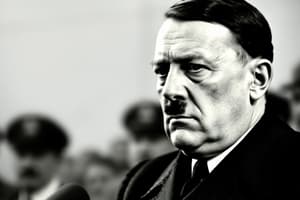Podcast
Questions and Answers
What was one significant outcome of the Munich Conference?
What was one significant outcome of the Munich Conference?
- The establishment of the United Nations
- The agreement to partition Poland
- The policy of appeasement was reinforced (correct)
- The beginning of World War II
Which battle is considered a strategic failure for Allied forces during WWII?
Which battle is considered a strategic failure for Allied forces during WWII?
- Operation Overlord
- Battle of Britain
- Dunkirk
- Dieppe (correct)
What was the significance of the Night of the Long Knives?
What was the significance of the Night of the Long Knives?
- It solidified Hitler's power by eliminating his rivals (correct)
- It was a public demonstration against anti-Semitism
- It was a military strategy used against Allied forces
- It marked the beginning of World War II
How did Canada's role in WWII influence its national identity?
How did Canada's role in WWII influence its national identity?
What does the term 'Blitzkrieg' refer to in the context of WWII?
What does the term 'Blitzkrieg' refer to in the context of WWII?
Flashcards
Blitzkrieg
Blitzkrieg
A strategy of using lightning-fast, heavily armored forces to overwhelm enemy defenses and achieve rapid breakthroughs.
The Holocaust
The Holocaust
The organized persecution and systematic genocide of six million European Jews by Nazi Germany and its collaborators during WWII. This was the culmination of anti-Semitism, a prejudice against Jews that has existed for centuries.
Appeasement
Appeasement
A policy of appeasement is when a country gives in to the demands of a more aggressive power to avoid conflict. It's like trying to buy peace by giving in to a bully.
Kristallnacht
Kristallnacht
Signup and view all the flashcards
The Battle of Britain
The Battle of Britain
Signup and view all the flashcards
Study Notes
Causes of WWII
- Treaty of Versailles harsh terms imposed on Germany fostered resentment and instability.
- Economic depression worldwide contributed to political extremism and social unrest.
- Rise of aggressive nationalism and expansionist ideologies in various countries (e.g., Fascism in Italy, Nazism in Germany).
- Failure of international cooperation and diplomacy to prevent conflict.
Adolf Hitler
- Hitler's rise to power fueled by exploiting economic hardship, nationalistic sentiment, and promises of restoring German pride. His charismatic leadership and effective propaganda captivated the German people.
Hitler’s Actions (examples)
- Kristallnacht: A violent pogrom against Jews in Germany.
- Night of the Long Knives: Elimination of political opponents within the Nazi party.
Appeasement
- Neville Chamberlain's policy of appeasement aimed to avoid war by making concessions to Adolf Hitler.
- Munich Conference: A meeting where Britain and France agreed to allow Germany to annex part of Czechoslovakia.
- Examples include allowing Germany to rearm, annex Austria, and occupy the Sudetenland.
Winston Churchill
- A staunch opponent of appeasement and a strong advocate for resisting Nazi Germany
Benito Mussolini and Fascism
- Fascist ideology emphasized national unity, strong leadership, and the use of force. It rejected democracy and individual rights.
Franklin Roosevelt and Isolationism
- Isolationism was the policy of staying out of international conflicts.
Battles of WWII (Chronological and Geographic)
- Blitzkrieg: Lightning war strategy emphasizing speed and surprise.
- Dunkirk: Evacuation of Allied soldiers from Dunkirk, France.
- Dieppe: Allied raid on Dieppe, France, (failed operation).
- Battle of Britain: Air battle over Britain.
- Operation Barbarossa: Nazi Germany's invasion of the Soviet Union.
- Pearl Harbor: Japanese attack on the US naval base.
- Italian Campaign/Ortona: Allied campaign in Italy.
- D-Day/Operation Overlord: Allied invasion of Normandy, France.
- Liberation of the Netherlands: Allied liberation of the Netherlands.
- Hiroshima and Nagasaki: Atomic bombings of Japanese cities.
- Invasion of Hong Kong: Japanese conquest of Hong Kong.
U-Boats and Convoy System
- U-Boats: German submarines used in naval warfare.
- Convoy System: Protection of ships in groups.
The Holocaust
- Systematic genocide of six million Jews.
Women during the War
- Increased women's participation in the workforce, taking on jobs traditionally held by men.
C.D. Howe
- Played a major role in managing Canada's war effort.
Canada's Contributions to WWII
- Significant contributions to the war effort, including troops, resources, and supplies.
Continuity and Change Questions
- Canada's shift from a British dominion to a more independent nation was marked by increased autonomy in military strategy and resource management. This was driven by greater participation and decision-making in wartime planning. Examples include D-Day and the Dieppe raid, which demonstrated Canada’s willingness to take initiative.
- War significantly expanded opportunities for women in the workforce, opening new avenues for employment and contributing to the broadening of their social rights and recognition.
- Technological advancements rapidly progressed during the war. New military technologies and innovations greatly impacted the efficiency, capabilities, and even scope of military operations, from aircraft design and radar developments to weaponry.
Studying That Suits You
Use AI to generate personalized quizzes and flashcards to suit your learning preferences.



